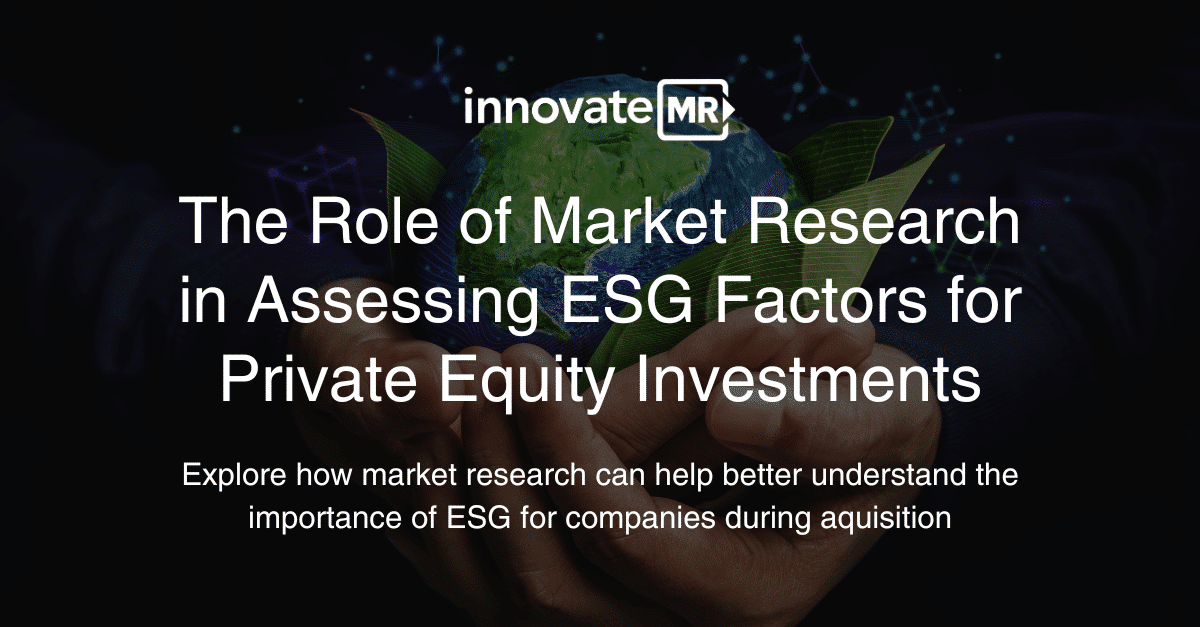The Role of Market Research in Assessing ESG Factors for Private Equity Investments

The integration of Environmental, Social, and Governance (ESG) factors into investment strategies has gained significant momentum. As stakeholders increasingly prioritize sustainability and ethical practices, private equity firms must adapt by rigorously assessing ESG factors. Market research plays a crucial role in this process, providing the necessary insights and data to inform investment decisions. In this blog, we delve into the importance of ESG in private equity and how market research can facilitate a thorough evaluation of these critical factors.
Understanding ESG in Private Equity
ESG factors encompass a broad range of criteria that measure a company’s ethical impact and sustainability practices. These factors are divided into three main categories:
- Environmental: Evaluate a company’s impact on the environment, including its carbon footprint, waste management, and resource conservation.
- Social: Assesses how a company manages relationships with employees, suppliers, customers, and communities. This includes labor practices, human rights, and community engagement.
- Governance: Examines the internal systems, controls, and procedures that ensure transparency, accountability, and ethical business practices.
Incorporating ESG factors into private equity investments is not just about mitigating risks but also about identifying opportunities for value creation and long-term growth.
The Role of Market Research in ESG Assessment
Market research is indispensable for private equity firms aiming to integrate ESG factors into their investment strategies. Here’s how market research contributes to a comprehensive ESG assessment:
1. Identifying ESG Risks and Opportunities
Market research helps identify potential ESG risks and opportunities associated with a target company. By analyzing industry trends, competitive landscapes, and regulatory environments, private equity firms can gauge how well a company is positioned to address ESG challenges and capitalize on sustainable opportunities.
2. Evaluating Stakeholder Perceptions
Understanding stakeholder perceptions is crucial for assessing a company’s social and governance performance. Market research techniques such as surveys, interviews, and sentiment analysis provide insights into how employees, customers, and communities view the company’s ESG practices. This feedback is vital for evaluating the company’s reputation and potential for social impact.
3. Benchmarking ESG Performance
Market research enables private equity firms to benchmark a company’s ESG performance against industry standards and competitors. By comparing ESG metrics and practices, firms can identify areas where the target company excels or falls short. This benchmarking process is essential for making informed investment decisions and setting ESG improvement targets post-acquisition.
4. Assessing Regulatory Compliance
Compliance with ESG-related regulations and standards is a critical component of due diligence. Market research provides up-to-date information on relevant regulations, helping private equity firms ensure that target companies meet legal and ethical standards. This reduces the risk of regulatory fines and enhances the firm’s reputation among investors and stakeholders.
5. Supporting ESG Integration Post-Investment
The role of market research extends beyond the initial investment decision. Post-acquisition, continuous market research helps monitor the target company’s ESG performance and track progress toward sustainability goals. This ongoing assessment supports the integration of ESG factors into the company’s operations, driving long-term value creation.
InnovateMR: Your Partner in ESG Market Research
At InnovateMR, we understand the critical role of ESG in private equity investments. Our comprehensive market research solutions provide the insights needed to assess ESG factors effectively. With our expertise in qualitative and quantitative research, we deliver actionable data that helps private equity firms make informed decisions and achieve sustainable growth.
Why Choose InnovateMR for ESG Market Research?
At InnovateMR, our team possesses deep knowledge and extensive experience, ensuring that our research is tailored to your specific needs. We utilize advanced methodologies to gather accurate and reliable data from diverse sources, including surveys, interviews, and analytics. Our global reach enables us to find niche, quality audiences across the globe, providing comprehensive insights for your investments. Additionally, we offer personalized research solutions, incorporating both qualitative and quantitative approaches, to align with your unique strategies and goals.
Conclusion
Incorporating ESG factors into private equity investments is essential for mitigating risks, enhancing returns, and promoting sustainable business practices. Market research plays a pivotal role in this process by providing the insights needed to assess ESG risks and opportunities thoroughly. At InnovateMR, we are committed to helping private equity firms navigate the complexities of ESG assessments and achieve long-term success.
Ready to assess your ESG capabilities? Contact InnovateMR today to learn more about our market research solutions.
About InnovateMR – InnovateMR is a full-service sampling and ResTech company that delivers faster, quality insights from business and consumer audiences utilizing cutting-edge technologies to support agile research. As industry pioneers, InnovateMR provides world-class end-to-end survey programming, targeted international sampling, qualitative and quantitative insights, and customized consultation services to support informed, data-driven strategies, and identify growth opportunities. Known for their celebrated status in customer service and results, InnovateMR combines boutique-level service with extensive global reach to achieve partner success.


